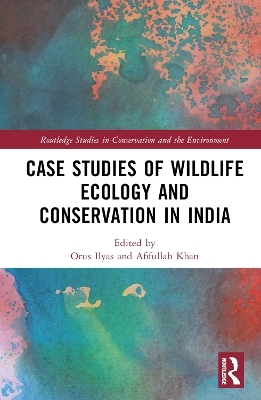
Case Studies of Wildlife Ecology and Conservation in India
Routledge (Verlag)
978-1-032-34298-6 (ISBN)
The book explores and examines a wide range of fauna across different terrains and habitats in India, revealing key issues and concerns for biodiversity conservation, with a particular emphasis on the impact of humans and climate change. Case-studies are as wide-ranging as tigers, leopards, sloth bears, pheasants, insects, and birds, across a diverse range of landscapes, including forests, wetlands, and nature reserves, and even a university campus. Split into three parts, Part I focuses on how the distribution of animals is influenced by the availability of resources such as food, water, and space. Chapters examine key determinants, such as diet and prey and habitat preferences, with habitat loss also being an important factor. In Part II, chapters examine human-wildlife interactions, dealing with issues such as the impact of urbanisation, the establishment of nature reserves, and competition for resources. The book concludes with an examination of landscape ecology and conservation, with chapters in Part III focusing on habitat degradation, changes in land-use patterns, and ecosystem management. Overall, the volume not only reflects the great breadth and depth of biodiversity in India but offers important insights into the challenges facing biodiversity conservation not only in this region but worldwide.
This volume will be of great interest to students and scholars of wildlife ecology, conservation biology, biodiversity conservation, and the environmental sciences more broadly.
Orus Ilyas is Associate Professor in the Department of Wildlife Sciences at Aligarh Muslim University, India. She has studied mammals in India since 1995 and has worked in the high-altitude Himalayas for more than 25 years. She has worked on various projects funded by government and non-government organisations, such as WWF India and the Council for Advancement of People’s Action and Rural Technology (CAPART). Afifullah Khan is Professor in the Department of Wildlife Sciences at Aligarh Muslim University, India. He started his research career by investigating the ecology of Asian elephants and continued to work on mammalian and avian species and communities. His current research explores ecological patterns and processes at a landscape level and the effects of EMF on plants and birds.
1. Introduction PART I Resource selection in Protected and Non-Protected areas 2. Prey Preferences of the Large Predators of Asia 3. Habitat Use Pattern of Indian Leopard in Western Himalaya 4. Insight on the Diet of the Golden Jackal 5. Blackbuck in Agricultural Landscape of Aligarh 6. Seasonal Variation in the Diet of Four-Horned Antelope 7. Do the Niches of Sympatric Sparrows Differ? 8. Avifauna of Suru Valley: Species Composition and Habitats 9. Indian Robin: Song Characteristics and Functions PART II Human–Wildlife Interaction 10. Human–Tiger Conflict in Corbett Tiger Reserve 11. Ecological Drivers of Livestock Depredation by Large Predators 12. Is Resource Sharing Leading to Human–Bear Interaction? 13. Bird Community Structure in Restored and Unrestored Areas in Delhi, India 14. Impact of Grazing on Bird Community in Binsar Wildlife Sanctuary 15. Insect Diversity in a Semi-Natural Environment 16. Dipteran Flies Associated with Abuse and Neglect: A Forensic Indicator PART III Landscape Ecology and Conservation 17. Conservation of Pheasants in Jammu and Kashmir: A Review 18. Avifaunal Diversity at Baba Ghulam Shah Badshah University Campus 19. Distribution and Conservation of Kashmir Gray Langur 20. Forest Classification of Panna Tiger Reserve 21. Wetland Inventory of Aligarh District 22. Web of Socioeconomic Considerations for Nature Conservation in Manipur Conclusion
| Erscheinungsdatum | 11.11.2022 |
|---|---|
| Reihe/Serie | Routledge Studies in Conservation and the Environment |
| Zusatzinfo | 46 Tables, black and white; 35 Line drawings, black and white; 19 Halftones, black and white; 54 Illustrations, black and white |
| Verlagsort | London |
| Sprache | englisch |
| Maße | 156 x 234 mm |
| Gewicht | 500 g |
| Themenwelt | Naturwissenschaften ► Biologie ► Botanik |
| Naturwissenschaften ► Biologie ► Ökologie / Naturschutz | |
| Sozialwissenschaften ► Soziologie ► Spezielle Soziologien | |
| Weitere Fachgebiete ► Land- / Forstwirtschaft / Fischerei | |
| ISBN-10 | 1-032-34298-6 / 1032342986 |
| ISBN-13 | 978-1-032-34298-6 / 9781032342986 |
| Zustand | Neuware |
| Informationen gemäß Produktsicherheitsverordnung (GPSR) | |
| Haben Sie eine Frage zum Produkt? |
aus dem Bereich


